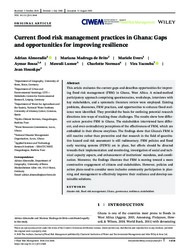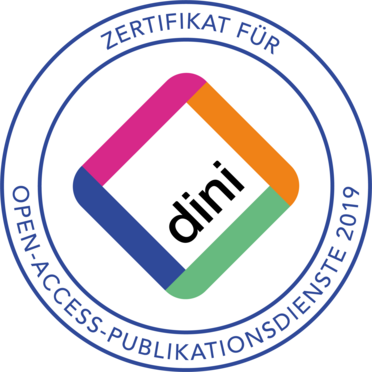Current flood risk management practices in Ghana: Gaps and opportunities for improving resilience
de Brito, Mariana Madruga
Evers, Mariele
Bossa, Aymar
Lumor, Mawuli
Norman, Charlotte
Hounkpe, Jean
DOI: https://doi.org/10.1111/jfr3.12664
Persistent URL: http://resolver.sub.uni-goettingen.de/purl?gldocs-11858/9502
Persistent URL: http://resolver.sub.uni-goettingen.de/purl?gldocs-11858/9502
Almoradie, Adrian; de Brito, Mariana Madruga; Evers, Mariele; Bossa, Aymar; Lumor, Mawuli; Norman, Charlotte; Yacouba, Yira; Hounkpe, Jean, 2020: Current flood risk management practices in Ghana: Gaps and opportunities for improving resilience. In: Journal of Flood Risk Management, Band 13, 4, DOI: 10.1111/jfr3.12664.
 |
Dokument öffnen: |
This article evaluates the current gaps and describes opportunities for improving flood risk management (FRM) in Ghana, West Africa. A mixed-method participatory approach comprising questionnaires, workshops, interviews with key stakeholders, and a systematic literature review were employed. Existing problems, discourses, FRM practices, and opportunities to enhance flood resilience were identified. They provided the basis for outlining potential research directions into ways of tracking these challenges. The results show how different actors perceive FRM in Ghana. The stakeholders interviewed have different, and even contradictory perceptions of the effectiveness of FRM, which are embedded in their diverse storylines. The findings show that Ghana's FRM is still reactive rather than preventive and that research in the field of quantitative hazard and risk assessment is still rudimentary. FRM policies and flood early warning systems (FEWS) are in place, but efforts should be directed towards their implementation and monitoring, investigation of social and technical capacity aspects, and enhancement of institutions’ mandates, and coordination. Moreover, the findings illustrate that FRM is moving toward a more constructive engagement of citizens and stakeholders. However, policies and action plans need to consider more inclusive community participation in planning and management to effectively improve their resilience and develop sustainable solutions.
Statistik:
ZugriffsstatistikSammlung:
- Geographie, Hydrologie [454]
This is an open access article under the terms of the Creative Commons Attribution License, which permits use, distribution and reproduction in any medium, provided the original work is properly cited.

